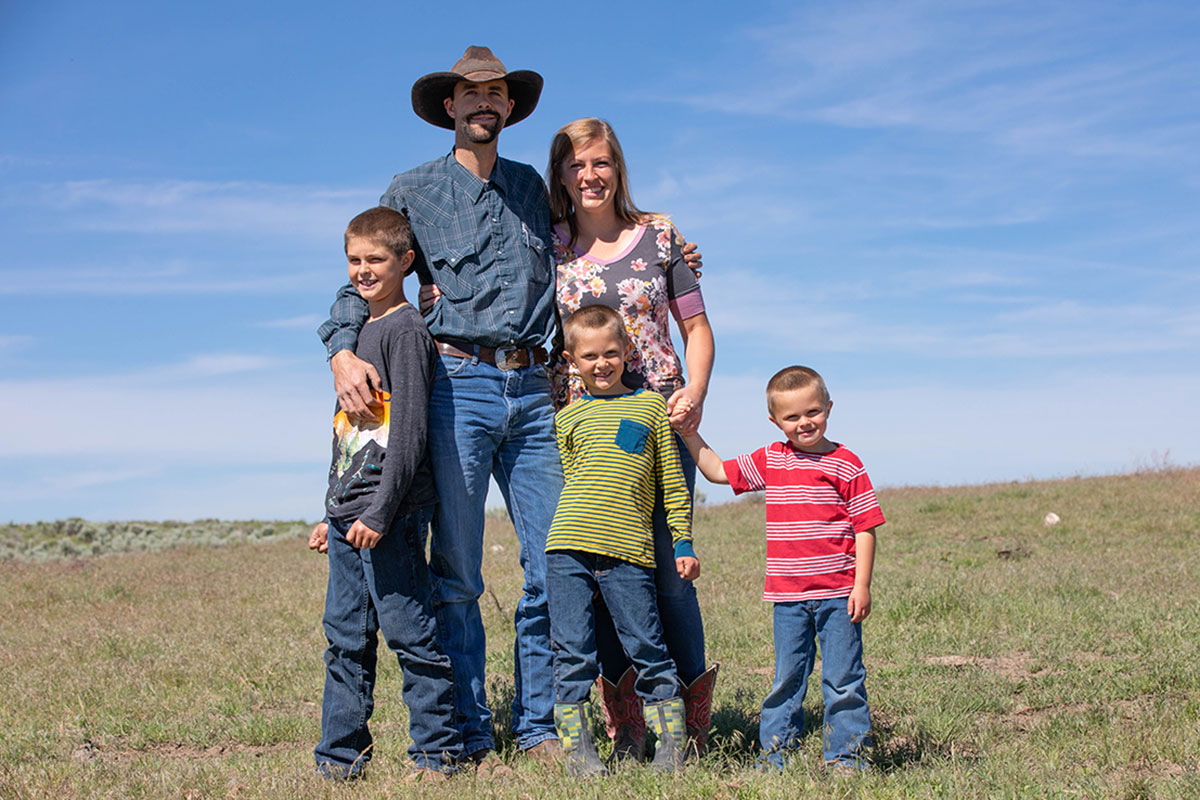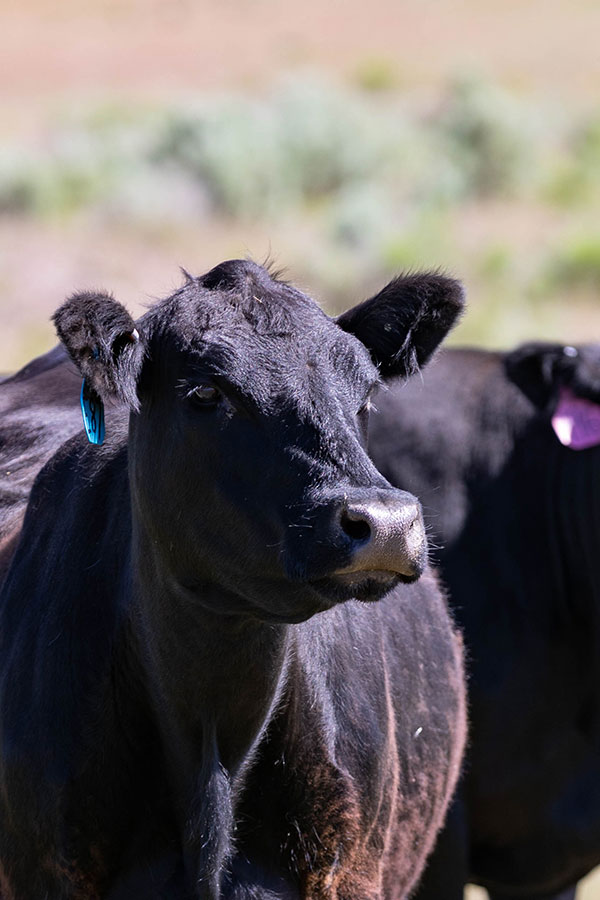
From chaos to dream ranch
Dreams can come true with enough focus and work
By: Chelsea Dinterman
Start-up isn’t a term you hear often in cattle ranching. Without land, cattle or knowledge handed down, the path to a successful ranch runs uphill.
Greg Brown of Pocatello, Idaho, let none of that stop him. The son of a sugar beet farmer knew he could make it with a little help, starting with a life partner.
“When Stephanie and I got married, it became our dream, both of us,” he says. “We got our house, and it had a little field, so I bought a cow-calf pair. We didn’t have a clue.”
Stories they tell from that first year are like cartoons. A cow gets out the first night home and runs miles and miles away. They buy their first horses and get bucked off, over and over again.
Then a chance meeting with a future benefactor helped them find their footing. Seriously.
“I didn’t even know who he was, but I said something to him about wishing I was in the cattle business,” Brown says, “and he replied, ‘I can probably help you with that.’ He gave me his number and told me to call him next fall. It was winter. I had to sit on his number for six or eight months and wonder what this was all about.”
On the first day of fall, a phone call and short visit led to an offer of 25 lease cows and space on the nearby ranch to run them. The year in Toon Town wouldn’t stop the Browns, only fuel their desire to make it in the real world.
“We leased those 25 cows. Again, a total wreck,” he has to admit. “We still didn’t have a clue what we were doing, but we had friends. We asked people. Studied. The next year [the leasing rancher] had somebody retire and there was room for 30 more head.”
The hard work paid off in three more years when the couple left their off-ranch jobs to make cattle their sole source of income.

Choices and changes
Moving up to the 500-cow herd they manage today took trial and error. With no plan or past to work from, each step forward started with a choice.
“As we were going along, it’s like we’re in an alley full of gates,” Brown says. “Those gates are choices, and we’re always wondering, ‘do we go this way or that way,’ because we have to pay the bills.”
Each decision included a focus on improving herd quality. The family started with bulls, changing breeds and setting criteria to be more selective than average.
“I see Angus as the way forward,” he says. “I believe we can make the highest quality product with the most functional cow. High quality for the end user and a functional cow for us.”
Brown has seen improvements in marketability and maternal characteristics since switching to the business breed when they went to full-time ranching.
Fine tuning genetic potential came next. Before heading to any Angus bull sale, Brown studies the catalog.
“Out of all the things I can control, genetics is the most important to me,” he says. “When we go to a bull sale, we are selecting genetics that will affect not only our cattle but our boys and their children, and their children. I see the cost of a bull to be fairly insignificant when you look at the females he produces.”
Marking EPDs (expected progeny differences) that meet his standards in green and those that don’t in pink, almost every bull he puts on his list carries the Certified Angus Beef ® (CAB®) brand’s Targeting the Brand™ logo.
“The decisions I make are going to add or detract value,” Brown says. “I see the Targeting the Brand logo as that, if every single bull in my bull battery has that logo, I can tell a feedlot that. I can show them that.”
High standards for high quality
He gives up nothing in other economically important traits for the herd.
“You do not have to sacrifice quality for maternal characteristics – you can have them all in one package, but you have to be extremely selective,” Brown says. “You can’t buy any old bull.”
His high standards are not limited to bulls. Replacement heifers face the same amount of scrutiny.
“I’m not going to go and buy the top end of the bull sale and then go into my heifer pen and pick the bottom end,” he says. “That’d be dumb. We’d end up with average, right?”
Instead, he looks at each heifer’s performance, while keeping temperament and phenotype in mind.
“They have to have been above average against all their peers,” Brown says “Then, when we’re sorting them, they come one at a time down the alley and we hold them to see what they do. If they’re bouncing off the walls, well they can go down the road. But if she just holds up and respects us, and you look at her and she’s got that depth of body and rectangular shape, great. She’s a keeper.”
Brown focuses on uniformity, making changes slowly to ensure his herd is producing predictable offspring each year. He evaluates pedigrees of bulls, watching for anything that stands out.
For example, he looks for bulls that have moderate size on both sides as opposed to crossing large and smaller-frame genetics. “Then you’re going to get 25% big, 25% little and 50% in the middle that still have the traits of big and little,” he explains. “You have to breed like kind to like kind.
“I’m using size just as an example, but can’t you do that in carcass traits?” he asks, with an answer in mind. “Growth and birth and mothering ability, can’t you do that with all of it?”
These high standards have been the key to adding value down the line, keeping the allowing Browns’ dream alive.
“You can’t take your calves to the sale barn every year, you just can’t do it. You have to market them in a progressive way,” he says. “In trying not to be a bottom-of-the-barrel rancher, we’re always looking for ways to add value to our product and produce something for a customer that they’ll be like, ‘Yeah, it’s worth more than that to us.’”
A family affair
This realized dream took more than just smart decisions. He gives credit to the whole family, their hard work and faith for the success over the years. Few peers and mentors held back on telling him it’s nearly impossible to make a living when you start from scratch in today’s cattle business.
“It was just the fire I needed,” Brown says. “At the time, I didn’t like those people, but I look back and sometimes it’s the people that discouraged you that you actually owe more to. It builds a fire in you that you’re like ‘No, I’m not giving up.’ There is no too late. There is no too early. We’ll do whatever it takes to make this happen.”
Each member of the family has a key role that helps keep the ranch running. While Brown is outside with the herd, Stephanie has learned to manage the office work like AngusSource, records and taxes, all while homeschooling their three boys. The kids also lend a helping hand.
“The boys are always busy doing something. They have a list every day of jobs that they gotta take care of. I couldn’t do it without them,” their father says. “Everybody’s busy and it’s fun. It’s rewarding. Most people say I’m a workaholic and should spend more time with my family, but they don’t realize how much my family’s actually working with me.”
It’s all part of the dream.
Originally ran in the Angus Beef Bulletin.
You May Also Like…
Marbling, Feet and Fertility: Are they related?
The Angus breed has enough genetic diversity to allow breeders, and their commercial bull customers, to make progress across multiple traits simultaneously. One bloodline may be high in marbling but does not check the boxes you need for other traits. That does not mean marbling is the cause—it simply means your search for the ideal genetic pairing is not done.
Customer First Mentality
When potential buyers fill the Connealy Angus sale barn, they’re not just there for the genetics but the customer service guarantee. For getting that and a lot more right, Connealy Angus was recognized with the 2024 Certified Angus Beef Seedstock Commitment to Excellence award.
Humble Growth
Customers from around the world file into the Shamrock Shack beside their sale ring each spring and fall. They’re not just buying into Connealy cattle, but the customer-service guarantee. For getting that and a lot more right, Connealy Angus was recognized with the 2024 Seedstock Commitment to Excellence award.




